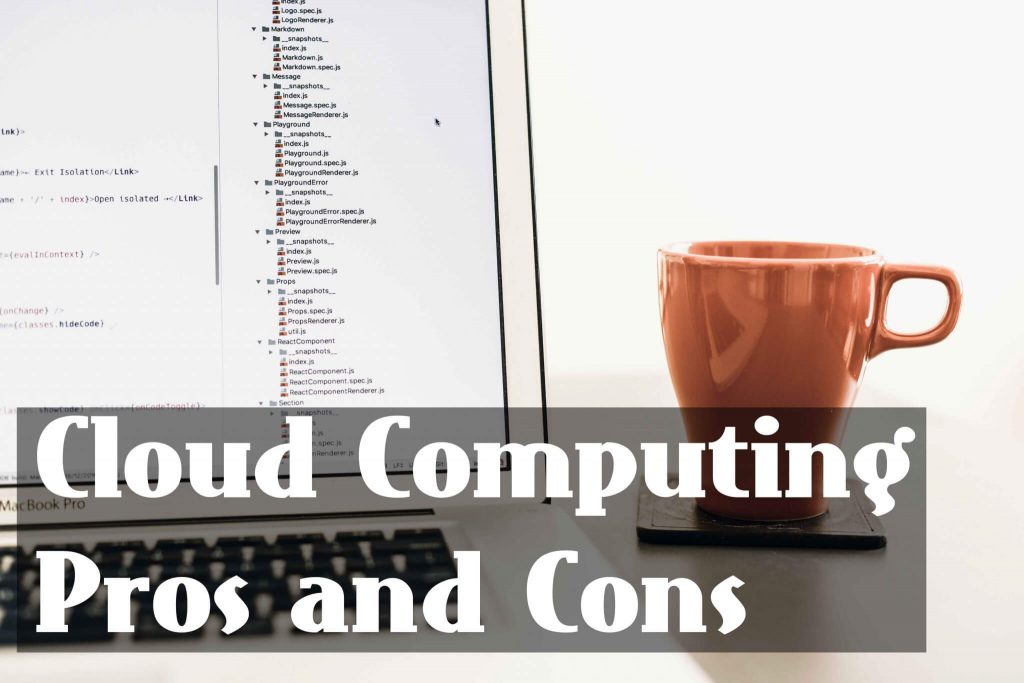Cloud computing is a general term for anything that involves delivering hosted services over the Internet. These services are broadly divided into three categories: Infrastructure-as-a-Service (IaaS), Platform-as-a-Service (PaaS) and Software-as-a-Service (SaaS). The name cloud computing was inspired by the cloud symbol that’s often used to represent the Internet in flowcharts and diagrams. As we all know, everything in this world have good and bad. Same goes to cloud computing, it also have advantages and disadvantages. So here the advantages and disadvantages of cloud computing.
Advantages of Cloud Computing
Over the past two decades, cloud computing has become a staple in business and private life. As tech-savvy businesses can attest, there are many benefits of cloud computing. Among the most important, cloud computing is:
- Convenient – Cloud computing centralizes information for fast and efficient storage and retrieval. Data is readily accessible to all stakeholders.
- Adaptable – Cloud computing allows for adaptable programs and applications that are customizable, while allowing owners control over the core code.
- Multi-tenant – Cloud software provides the opportunity to provide personalized applications and portals to a number of customers or tenants.
- Reliable – Because cloud systems are hosted by third parties, businesses and other users have greater assurance of reliability, and when there are problems, easy access to customer support.
- Scalable – With the Internet of Things, it is essential that software functions across every device and integrates with other applications. Cloud applications can provide this.
- Secure – Cloud computing can also guarantee a more secure environment thanks to increased resources for security and centralization of data.
Disadvantages
1. Network Connection Dependency
In order to reap the benefits of cloud computing, your business must always have an internet connection. Unfortunately, there is no way to get around this fact. You need a network in order to send files to the cloud and retrieve them.
You need a network to be able to use your virtual machines even if you opt for an IaaS, Infrastructure-as-a-Service. If you lose your network connection because of a storm or an outage, you may experience some downtime. However, a good Hosted Services provider will help you develop a business continuity plan, as well as the promise to deliver an SLA of more than 95% uptime.
2. Limited Features
Not all cloud providers are created equally. When you use cloud computing for storage and backup, you should ideally be working with a provider who offers the value of unlimited bandwidth. You may also experience limited storage space or accessibility. SaaS offerings may usually begin with a free package, but you will be charged for premium offerings and extra space. Can your business afford the costs as your business needs grow?
The answer to the concern of limited features is to partner with a Hosted Services provider who can meet your cloud storage, virtualization, and backup needs both now and in the future when your business grows. Ideally, you will want to work with a provider who will offer you a Hosted Services package at the highest value for the features and space your business needs.
3. Loss of Control
Essentially,you are trusting another party to take care of your data. You are trusting that they will maintain their data centers and servers with the same care as you would, if not more. You have to trust that your provider’s data centers are compliant and secured both physically and online. Some find the lack of in-house control of the server unnerving.
If this is one of your concerns, work with a partner with local contacts. Speak one-on-one with a representative who can address your access concerns, and learn about the measures that the Hosted Services company takes to ensure the integrity and safety of their cloud servers.
4. Security
Cloud hacking cases as recent as the past few months have shown that not all cloud providers are as secure as they claim to be. As a business, you can’t afford to have sensitive information about your company or your clients fall victim to hackers. One of cloud computing’s greatest disadvantages is that you don’t always know which providers you can trust.
This cloud computing disadvantage is more prevalent in SaaS providers than with Hosted providers. Because of the popularity of SaaS providers, they get targeted more frequently, and more easily, than a Hosted provider.
5. Technical Issues
If you experience any technical issues, you have no choice but to call your hosted provider’s technical support for help. You cannot fix your cloud computing problems in-house, and some providers do not offer around-the-clock technical support.
There is an easy fix to remediate this concern: pick a Hosted Services provider who offers 24/7 support to their clients.




